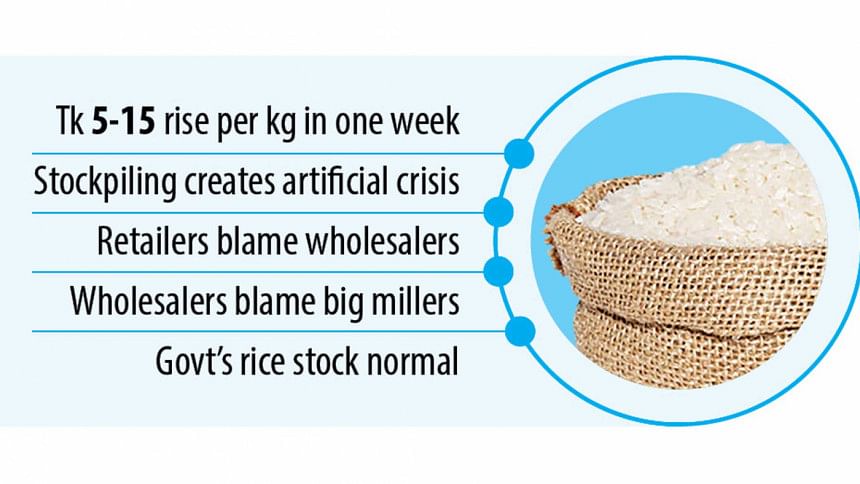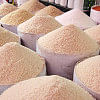Poor, middle class: Soaring rice price deepens their plight

Azmat Ali is a daily wage earner in the northern district of Lalmonirhat. Just a week ago, he bought coarse rice for Tk 44-45 a kg. But yesterday he found the price of the staple rose to Tk 52.
"Now it has become more difficult to run my family with the money I earn as my daily wage has not increased. It's still Tk 300," he said.
Shahed Ali of Sylhet's Baluchar area is in almost similar situation. A carpenter by profession, he could feed his family with the earnings from woodworking even a few months ago.
"But now," he says, "the way prices of rice and other commodities are increasing, I cannot make ends meet. I had no alternative but to turn to my small savings which are also drying up fast."
Over the last one week, the prices of both coarse and fine rice varieties rose by Tk 5 to Tk 10 per kg in retail markets, worsening things for the poor and fixed-income groups, already struggling with the rising cost of living.
A kilogram of coarse rice like Swarna was being sold at Tk 52 to Tk 54 at different markets in the capital and other parts of the country yesterday. Just a week ago, the price was Tk 40 to Tk 42.
The situation is almost the same for the fine rice varieties. A kg of miniket rice is sold for Tk 70, which was Tk 62 to Tk 65 a week ago. Nazirshail, another premium rice variety, now costs Tk 90 to Tk 95 per kg. The price was hovering between Tk 80 and Tk 85 last week.
"Things have become extremely difficult for the limited-income people like me because of the soaring price of rice and other essentials. If prices continue to go up, how will we survive?" questioned Abu Saleh, a college teacher in Rajshahi.
Our correspondents from several districts including Rajshahi, Chapainawabganj, Mymensingh, Sylhet, Pabna, Dinajpur, Kushtia, Faridpur, Bogura, Thakurgaon, Pirjopur, Barisal and Gazipur visited rice markets yesterday and found the lowest price of any variety was Tk 52.
Retailers say wholesalers cashed in on the rising trend of rice price and reduced supply, while the latter cited the increase in transport and other costs for the price hike.
The wholesalers also put the blame on the big millers for creating an artificial crisis by stockpiling paddy and rice.
The rice millers, on the other hand, said farmers sold paddy at a higher rate. An increase in their production cost amid the fuel price hike ultimately contributed to such a rise in the rice price, they claimed.
Rice price has been seeing an upward trend over the last one month after a low yield of Boro due to flooding, and an increase in the wheat price at the international market leading to soaring demand of rice.
A syndicate of big traders and wholesalers seized the opportunity to increase the price by creating an artificial crisis, said the millers.
Even the government's move to reduce the import duty from 62 percent to 25 percent last month is yet to make any impact on the rice market because of the low import.
Following the reduction of import duty, only 26,850 tonnes of the grain entered Bangladesh between July 1 and August 14 though the government gave permission to private firms to import nearly 10 lakh tonnes and market it before the Aman harvest in November-December period, said food ministry sources.
"Traders are not importing as the price of rice in the Indian market increased after our government reduced the import duty," said Nirod Baran Saha, president of the Paddy and Rice Stockists and Wholesalers' Association in Naogaon, referring to media reports.
According to a report run by the Economic Times of India on August 1, prices of all varieties of rice have increased by up to 30 percent since the beginning of June, due to higher demand from Bangladesh, Iran, Iraq and Saudi Arabia and also a shortage in paddy acreage in several Indian states.
In the meantime, people belonging to limited- and lower-income brackets are bearing the brunt of the situation as they are struggling to keep heads above the water due to the rise in prices of essentials.
BLAME GAME
Mohammad Amanullah, a rice trader from Pirojpur town, said the price of every sack of 50-kg rice went up by up to Tk 500 in the wholesale market.
"When the price began to rise, wholesalers created an artificial crisis of rice and they supplied fewer sacks than our demand for several days," he claimed.
Amanullah said the wholesalers and millers are responsible for the increasing price and that they maintain the business through a syndicate.
Faruque Ahmed, general secretary of Sylhet District Rice Traders' Association, said, "Due to the flood, the quality of freshly produced Boro in the greater Sylhet region fell dramatically. While flood affected the price in the first place, our expenses increased further due to the fuel price hike."
"But," he claimed, "the syndicate of traders took advantage of the situation by increasing the price."
The wholesales and small millers, however, said it is the big mill owners who have created an artificial crisis.
"Large millers are now controlling the market and they have so much stock that many of them are hiring our warehouses for storing rice," said Md Kamal Uddin, owner of Kamal Auto Rice Mill from Rajshahi.
Akhtaruzzaman Russel, general manager of AR Specialised Rice Mill, one of the biggest rice manufacturing companies, claimed that the price of paddy soared at the farmers' level and the increase in the production cost only worsened the situation.
Besides, the electricity bills and other costs like that of transportation rose by 2 to 3 percent, which caused the production cost of rice to go up by Tk 4 to 5 each kg, he said.
Currently, the government has a stock of 18.76 lakh tonnes of grains including 15.43 lakh tonnes of rice and 1.29 lakh tonnes of paddy as of August 14.
The country needs over 3.5 crore tonnes of rice every year. Most of the stock remains with the private traders who control the rice market.
MONITOR THE MARKET
Dr AM Asaduzzaman, former research director of Bangladesh Institute of Development Studies (BIDS), said the price hike of rice is not only affecting the poor section of the society, people of limited-income groups are also bearing the brunt of the situation.
He suggested that the government should monitor and ask the big traders and rice mill owners the reasons for increasing the price. "If the government gets to know the reason, it would be able to control it," he said.
Contacted, Ismiel Hossain, secretary to the ministry of food, alleged that the traders have been increasing the price of rice at their will.
"It is not like the price went up due to the rise of production cost. They [traders and millers] already stockpiled rice and paddy. If they cite the rise in fuel price as the reason, they should have increased the price not more than Tk 1," he said.
About the monitoring, the secretary said the government does not have enough manpower to monitor every market in the country.
On import, he said the deadline for importing rice has been extended till the end of September.
"The government will sell 2.5 lakh tonnes of rice under the open market sale programme each month starting from September 1. We will ensure that the poor people get rice at a cheaper rate," he added.

 For all latest news, follow The Daily Star's Google News channel.
For all latest news, follow The Daily Star's Google News channel. 








Comments